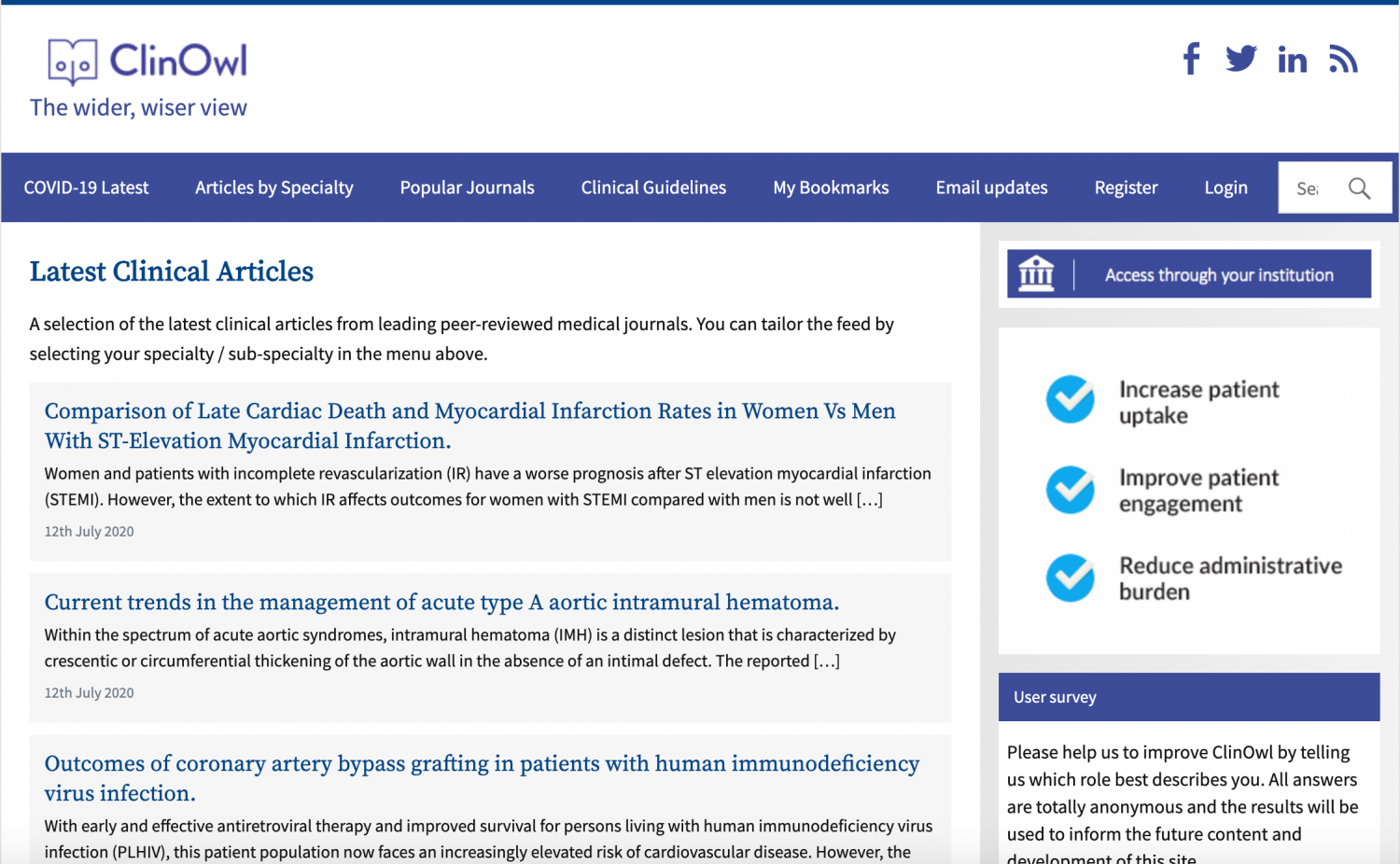Teaming up to make CPD easier
ClinOwl and OpenAthens join forces to help HCPs find the most relevant, trustworthy research.
Medical research is progressing at an ever-increasing rate; the last ten years alone have seen countless transformative advances, changing the way we research and develop medicines. This has never been more evident than during the current COVID-19 pandemic where we have seen novel vaccines progress faster than ever before through clinical trials, the development of innovative new treatments and the repurposing of existing therapies for the benefit of patients globally. The internet makes all this research readily available for healthcare professionals (HCPs), with specialist journals for every conceivable field of study, however, in times when healthcare professionals are pushed to their limits, finding the time to trawl through research to find high-quality, relevant developments can seem impossible.
Not only are HCPs required to complete a certain amount of Continued Professional Development (CPD) by their respective professional bodies, it is also essential for doctors, nurses and other medical professionals to keep on top of the latest developments to make better clinical decisions for the benefit of their patients. So how can we help make the process as easy as possible?
Digging through quantity for quality
On the surface, the escalation of online medical journals would seem to make keeping on top of current clinical research easier, but the sheer quantity of papers being published can make sifting for relevant research challenging, even for the most tech savvy. This is compounded by the number of different journals, publishers and platforms on offer, all publishing research targeted at different specialisms. Filtering out irrelevant and low-quality research is therefore an important but time-consuming task.
Often, medical conditions will overlap different specialties, requiring HCPs to be up to date on a number of different areas and the points at which they intersect. The treatment of Chronic Kidney Disease is just one of many diseases that benefits from a multidisciplinary approach[1]. Research from one area can also have applications across many others. As we are seeing in the research into COVID-19, there are a number of treatments which, whilst originally developed for one disease, might have beneficial effects for another[2]. Again, this requires medical professionals to be able to find relevant research from a wide range of specialties and sub-specialties.
Making the most of limited time
HCPs have very little spare time, especially during a global health crisis, more often than not working more and longer shifts than contracted[3]. This leaves little time for reading, but they still need to keep up to date, not in the least as a certain number of hours is required for CPD accreditation[4]. It is therefore vital that finding the most relevant research is made as quick and easy as possible.
Ease and speed with new tech
Across medicine, new technology is making drastic improvements to the way patients are treated, monitored and cared for. Digitalisation of patient records, analysis of patient data and real time reporting are all contributing to improved patient care and helping to make HCPs’ lives easier[5]. Learning should not be any different, and with the rapid progress being made in data management and machine learning, giving medical professionals access to comprehensive, relevant and trustworthy research at their fingertips is possible, and should be a priority. One such organisation aiming to do just that is ClinOwl, a free content discovery platform for healthcare professionals and medical researchers which collates and curates the latest articles from leading medical journals into a single portal.
The ClinOwl platform collates medical research from multiple peer reviewed sources into one, easy to use platform. This ensures access to trustworthy, high-quality research which spans all areas of study. Users can then filter articles by specialty and sub-specialty, with over 140 categories to choose from, to quickly find the most relevant papers. This saves time and facilitates the learning needed to keep on top of the latest developments, help patients and advance the careers of ambitious HCPs. The ClinOwl COVID-19 resource hub is proving particularly popular at the moment with over 14,000 clinical research articles searchable by important keywords such as diagnosis, symptoms, guidelines and treatment.
“Good, simple website. Easy to navigate with interesting and informative content”
– ClinOwl user
Collaboration for success
ClinOwl recently announced that it has teamed up with OpenAthens, the well-known content access platform used by organisations all over the world. This new integration allows seamless transition from the ClinOwl portal to access selected articles in full on publisher sites that support OpenAthens institutional access. OpenAthens users will now be able to use ClinOwl to more easily stay up to date as they continue to face ever increasing demands on their time. ClinOwl/OpenAthens users are also able to access additional functionality and personalisation, such as bookmarking for future reference and suggestions of relevant articles based on their previous content consumption.

Kieran Prince, International Sales Manager at OpenAthens, commented: “I really like the focussed approach ClinOwl have taken to truly understand their user’s needs. We’re delighted to welcome ClinOwl to OpenAthens and our library customers.”
With ever more information available to HCPs, it’s more important than ever that they find the most relevant and high-quality research to refine and improve their knowledge base to best treat their patients. ClinOwl and OpenAthens have recognised the benefit of each other’s platforms and by combining access are facilitating and improving the learning process.
Login to ClinOwl with your OpenAthens credentials or create your own free account today to access the latest, most relevant clinical resources and stay up to date with innovative research.
[1]https://www.ncbi.nlm.nih.gov/pmc/articles/PMC4199857/
[2]https://science.sciencemag.org/content/368/6493/829
[3]https://www.bpmed.com.au/blog/21/doctors-are-still-working-too-many-hours#:~:text=Some%20doctors%20even%20reported%20working,twice%20during%20the%20audit%20period
[4]https://cpduk.co.uk/news-articles/cpd-for-doctors-surgeons-physicians#:~:text=Typically%20doctors%2C%20surgeons%20and%20physicians,as%2050%20hours%20per%20annum
[5]https://www.aimseducation.edu/blog/the-impact-of-technology-on-healthcare/
Got an innovation you need bringing to life?
We’d love to hear from you! Head to our contact page to start a conversation.
